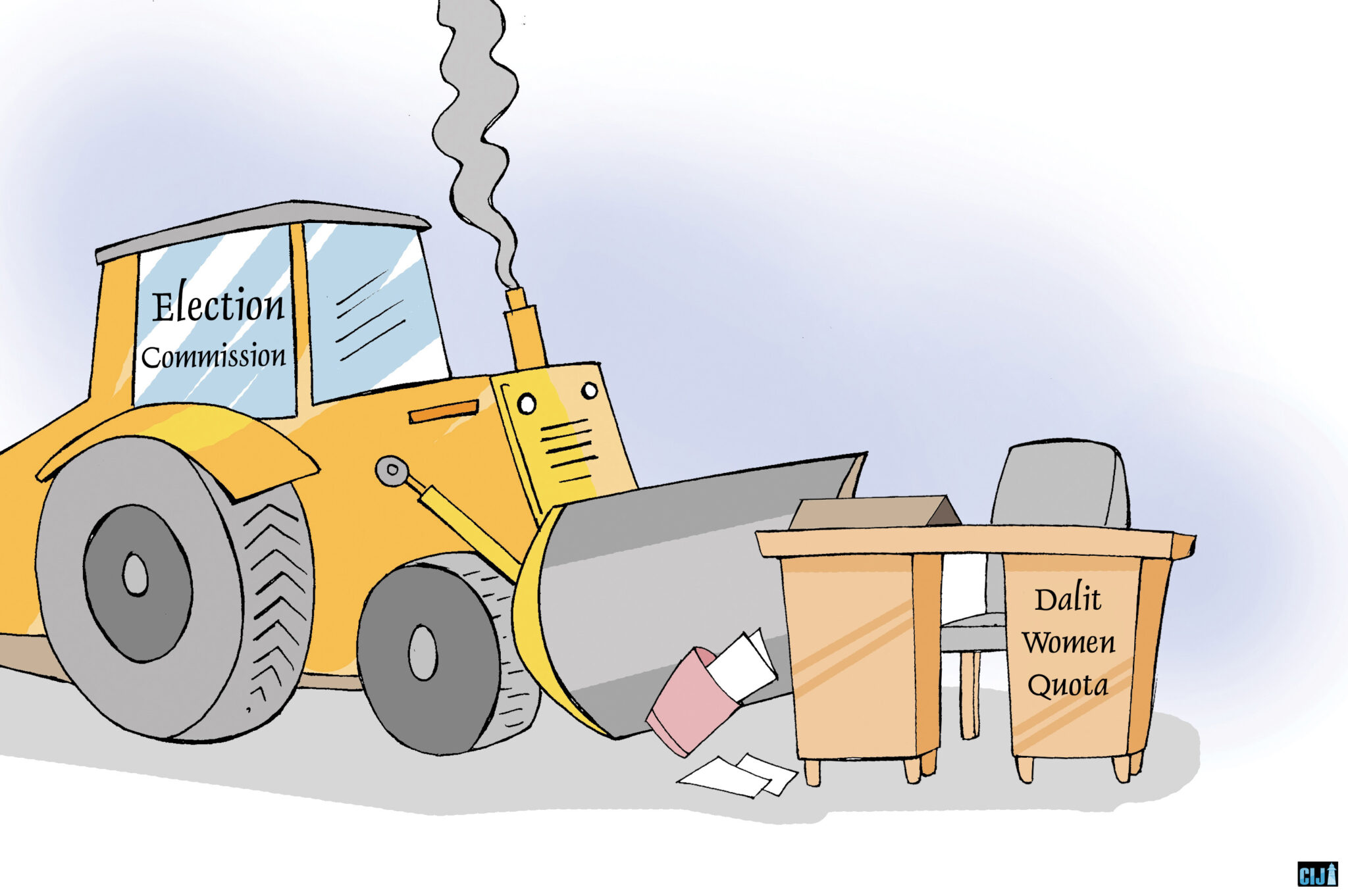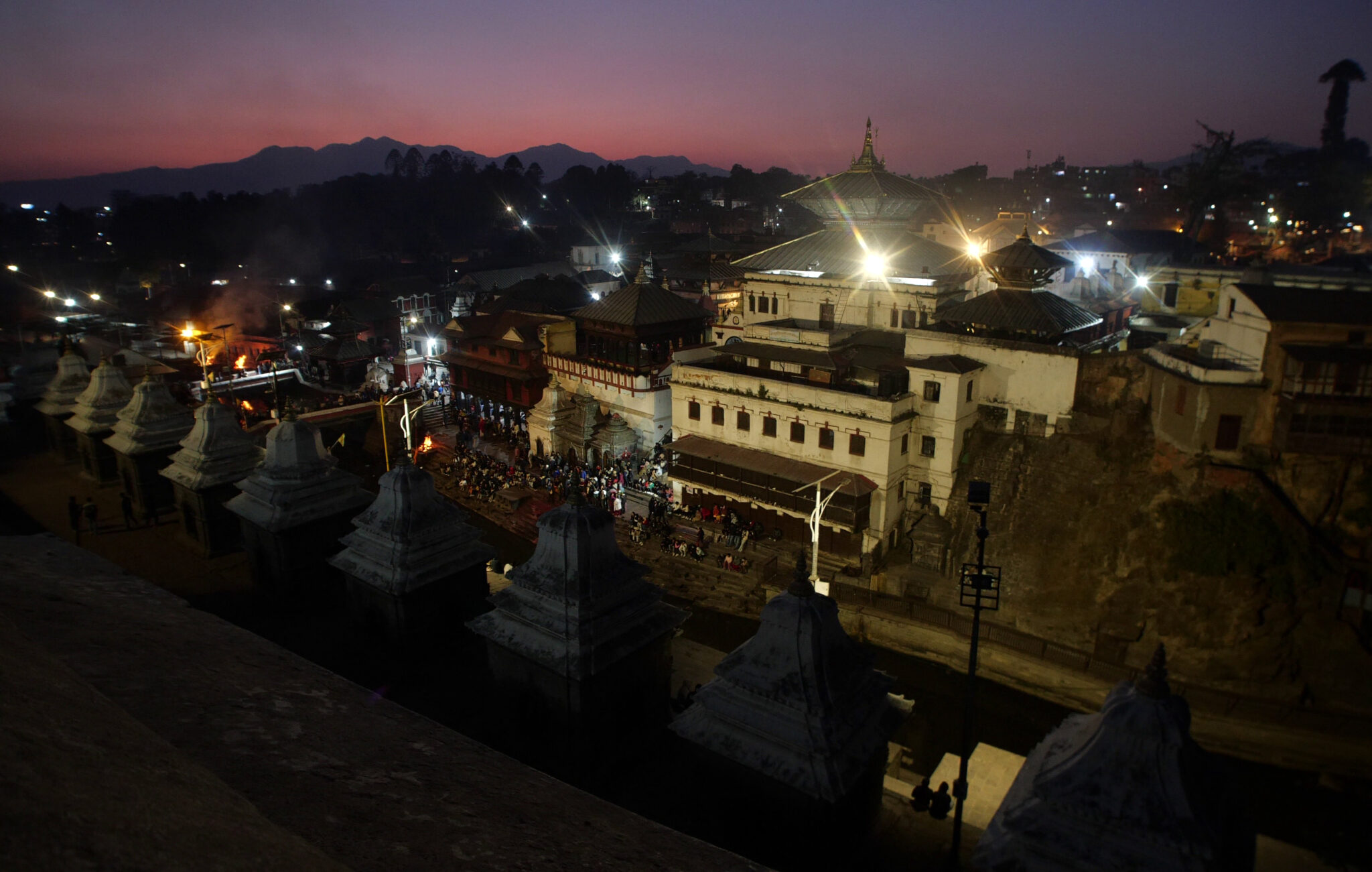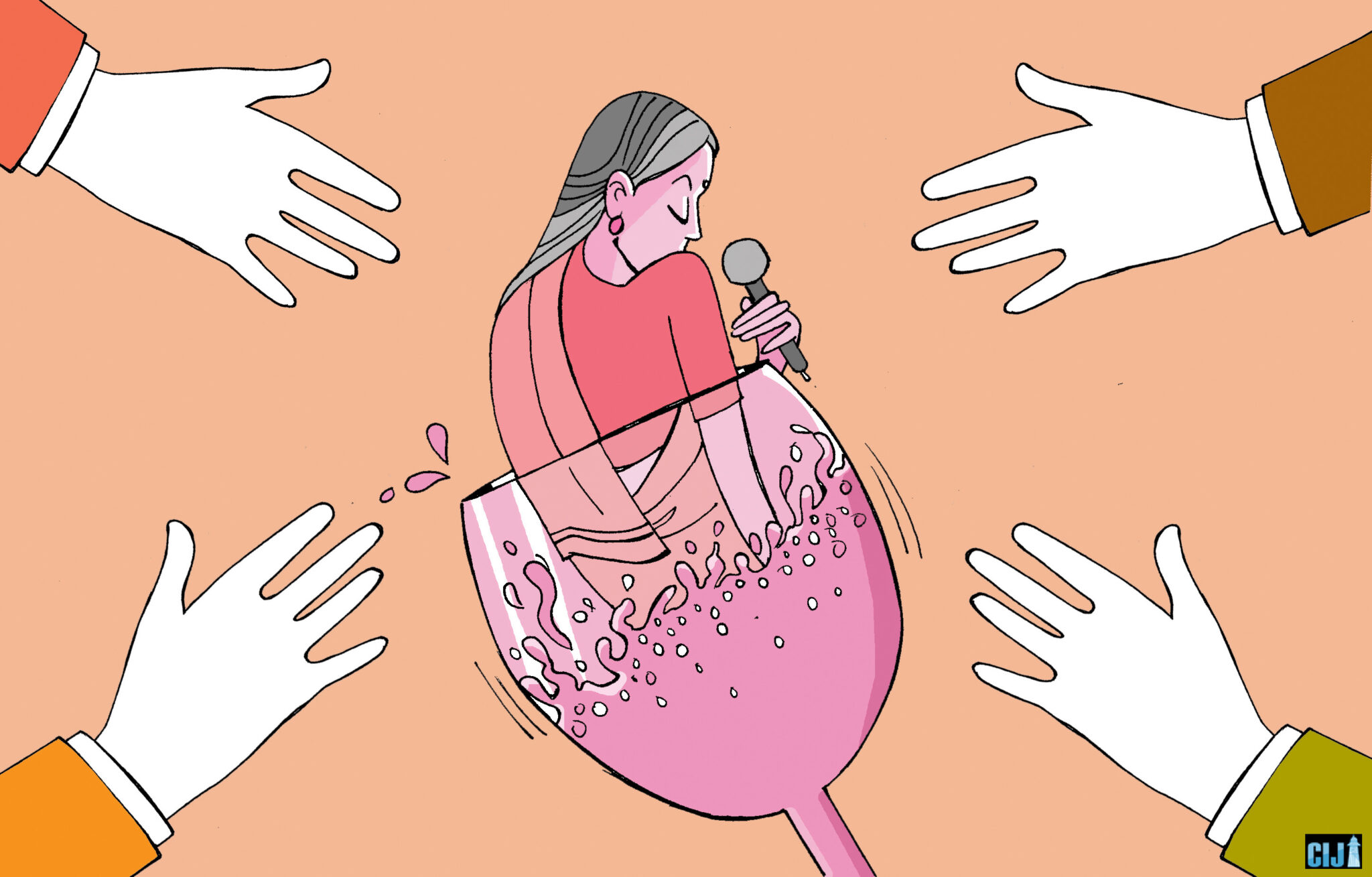The chhaupadi system has hindered the development of Karnali and Sudurpaschim even as huge investments and grand strategies are made in the name of eradicating this practice.
Basant Pratap Singh (Bajhang), Bidhya Rai (Kathmandu) |CIJ, Nepal
A chhaugoth (a shed built to isolate women during their menses) was put on display at the First National Conference on Menstrual Health Management held at Hotel Yak and Yeti in Durbar Marg, Kathmandu.
During the conference held on December 11, 2018, representatives from various organisations, activists and teenagers from countries such as Germany, the UK, and the US observed the ‘menstrual hut’ put on display on the second floor of the hotel.
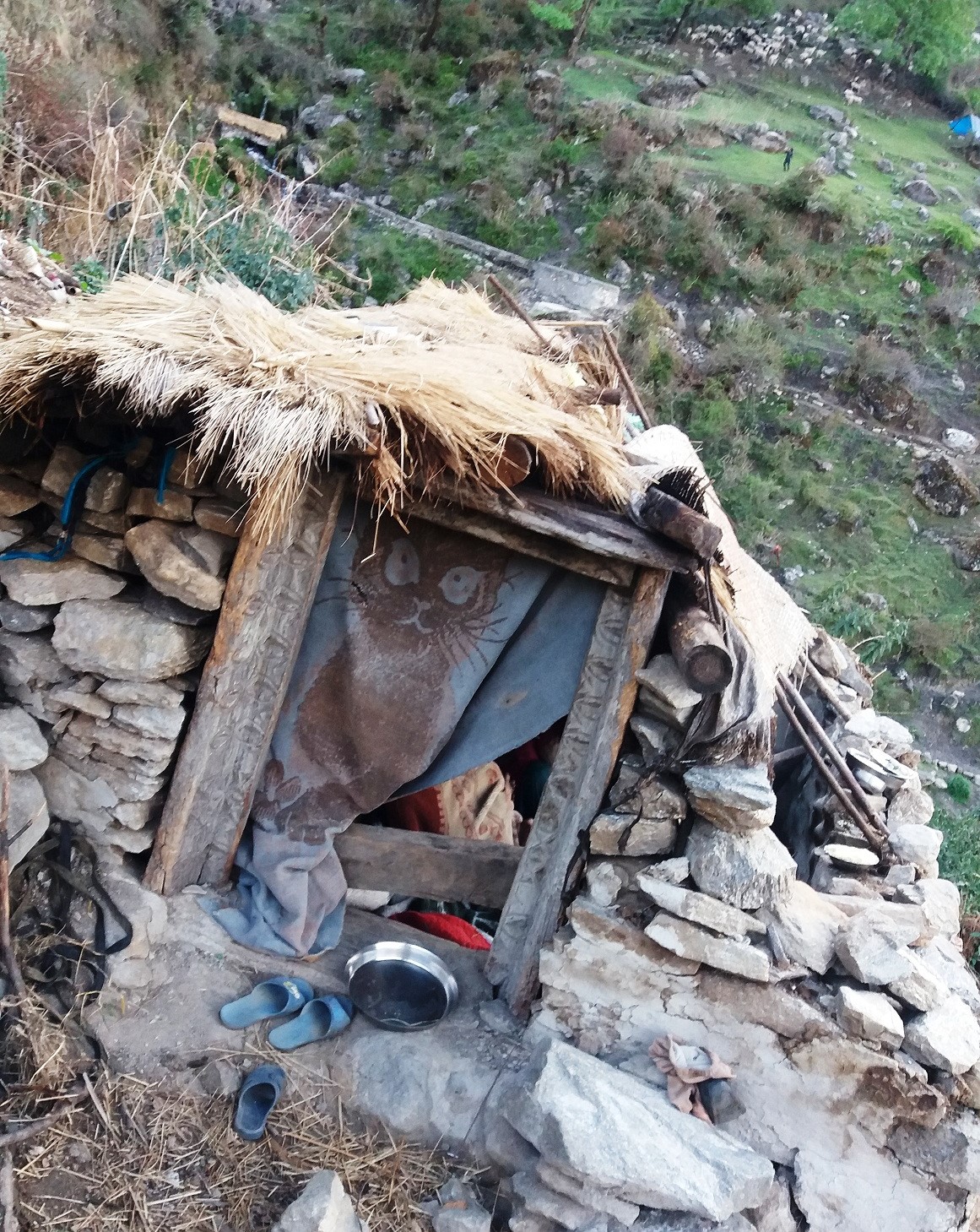
As part of the campaign to demolish the shed, a new shed was built dangerously in Saipal after the old one was demolished. Photos: Basant Pratap Singh
According to Gunaraj Shrestha, coordinator of the network of organisations working in the field of health and sanitation management, around $40,000 was spent on the one-day conference organised by the government of Nepal in collaboration with the network. The event was bankrolled by the German Agency for International Development (GIZ).
Thirty-five-year-old Amba Bohora and her two sons (nine-year-old Suresh and seven-year-old Ramit) of Agaupani, Budhinanda municipality-9, Bajura, died in a menstrual shed 19 days after the conference.
Police reports suggest that the trio died from suffocation as the shed caught fire lit to keep it warm during the harsh December winter. Ironically, Budhinanda, where such a tragic incident took place, had recently been declared a chhaupadi-free zone. Video footage from the campaign to demolish the sheds was also screened at the conference in Kathmandu.
A year after the Kathmandu conference, 21-year-old Parvati Rawat of Sanphebagar Municipality-3, Achham, also died due to suffocation while staying at her menstrual shed on December 2, 2019. Rawat, who had been married for a year, breathed her last as the 16-day annual campaign against violence against women was in full swing across the country.
When police tried to file a case against her brother-in-law Chhatra Rawat for forcing Parvati to live in the shed, no one filed a complaint. Based on a police investigation, the brother-in-law was arrested three days later on December 5. The court sentenced him to 45 days in prison.
After Parvati’s death, activists launched a campaign to declare Achham menstrual shed-free within the Nepali New Year (mid-April 2022), and police even started demolishing the sheds with support from the local people’s representatives. Then, on January 22, 2020, the Ministry of Home Affairs directed the district administration offices to dismantle menstrual sheds in 19 districts of the Sudurpaschim and Karnali provinces. More than 8,000 sheds were demolished and around 100 municipalities and rural municipalities were declared menstrual shed-free.
But now, all the demolished sheds have been rebuilt. Activist Pashupati Kunwar of Achham says, ” There was a campaign to demolish sheds that went on for some time. Then, everyone kept quiet on the pretext of the Covid-19 epidemic, and the sheds sprung up again.”
Money down the drain
The National Penal Code 2017, which came into force on August 17, 2018, treats the practice of chhaupadi as a criminal offence. Sub-section (3) of section 168 states, “A woman should not be subjected to any kind of discrimination, touching or inhumane treatment during menstruation or delivery.” A person who commits such an offence is liable to be punished with imprisonment of three months and a fine of Rs 3,000 or both. If a civil servant commits this offence, s/he shall be imprisoned for an additional three months.
All three levels of government and numerous non-governmental organisations have spent a lot of money in the name of eradicating chhaupadi in 19 districts of Sudurpaschim and Karnali provinces but in vain.

The women of Saipal Rural Municipality sitting in a shed.
Even when the right to information was used to get the details of the total expenses incurred for the eradication of chhaupadi, only details of expenses incurred by the government and a few organisations could be found. However, available data shows a massive amount has been spent on such campaigns.
According to records maintained by the planning section of the Social Welfare Council, between 2006 and 2022, 10 non-governmental organisations such as Collaboration Action for Dignity (based in Chandannath, Jumla), Action Works Nepal (based in Thapathali in Kathmandu), Nepal Austria Partnership Organisation (based in Humla), Women Uplift Society (based in Baitadi), Environment Conservation Forum Nepal (based in Achham), Jagaran Nepal (based in Kathmandu), Legal Aid and Consultancy Centre (based in Kathmandu), Institutional Development Network (based in Lalitpur), Radha Foundation (based in Kathmandu) and Women Development Forum (based in Bajura) spent Rs 109.7 million for programmes aimed at eradicating chhaupadi.
Save the Children signed an agreement with the government on May 4, 2007, agreeing to spend Rs 39.3 million until 2015 on chhaupadi eradication programmes in Achham, Bajura and Doti.
The 52nd report of the Auditor General states that Save the Children spent Rs 104.8 million on control of discrimination and violence under the chhaupadi system in 2014/15. The report pointed out that the aid amount was spent without the programme being included in the government’s budget and programmes.
Netra Prasad Paudel, director at the Office of the Auditor General, says that according to rule 271 of the Financial Procedures Regulations, the approval of the National Planning Commission and the Ministry of Finance must be obtained when receiving foreign aid and the ministry concerned must include it in the budget and programme.
He says, “Foreign donor agencies don’t want to enter the budget cycle of the government. Because of this, some spend the budget based on their own judgement, and hence some of the money doesn’t reach the target group.
According to the records of the Social Welfare Council, billions have been spent by international non-governmental organisations in Sudurpaschim and Karnali provinces to eliminate the chhaupadi system as an inter-related (cross-cutting) issue.
According to the information provided by the council, eight international non-governmental organisations: Centre for International Studies and Cooperation, Mercy Corps, Practical Action, International Nepal Fellowship, Population Service International, The DJI Foundation and Good Neighbor International South Korea have donated Rs 5.6367 billion for the cause.
Similarly, the Ministry of Women, Children and Senior Citizens spent Rs. 27.8 million in the Darchula, Baitadi, Dadeldhura, Kanchanpur, Bajhang, Bajura, Doti, Achham, Kailali, Rukum West, Salyan, Dolpa, Jumla, Humla, Mugu, Kalikot, Jajarkot, Dailekh and Surkhet districts in the last nine years in the name of training, social awareness and felicitations for the eradication of the chhaupadi system.
As mentioned in annual reports of the Department of Women and Children from the fiscal year 2009/10 to 2017/18, the department spent Rs 266.8 million on cross cutting issues (the highest area of the expenses) whereas Rs 3.9 million was spent on the chhaupadi practice eradication from the fiscal year 2015/16 to 2017/18.
The details of the expenses incurred by the local governments during this period are not included in these reports. The expenses incurred by the then district development committees, village development committees and today’s municipalities and rural municipalities in the Karnali and Sudurpaschim provinces in the name of the chhaupadi system eradication exceed Rs 2 billion.
None of the government agencies has aggregate data on the number of organisations working for the eradication of the chhaupadi system in these two provinces and the amount they are spending on such campaigns.
Even with such a large investment, the chhaupadi practice prevails in a pervasive way. Parvati Awasthi, head of the Women and Children’s Unit of the Bajhang District Police Office, who participated in an operation to demolish the sheds, says, “Even though the villagers threw stones at us, we demolished the sheds. Yet, we couldn’t demolish their superstitions. The sheds were rebuilt in a few days.”
Journey to the tents
Saipal Rural Municipality, Bajhang, demolished six menstrual sheds in Dhuli village in May-June 2018. The women on their periods later pitched tents on their agricultural land. Before the onset of the monsoon, they had built new sheds.
The new sheds were relatively comfortable with big windows and doors. The money saved in the local women’s group through a mobile funding scheme was used to make this shed that could house up to eight people at a time. But, soon, police came to know about it and demolished them. Since there is a police station in the village itself, villagers haven’t dared to build another shed.
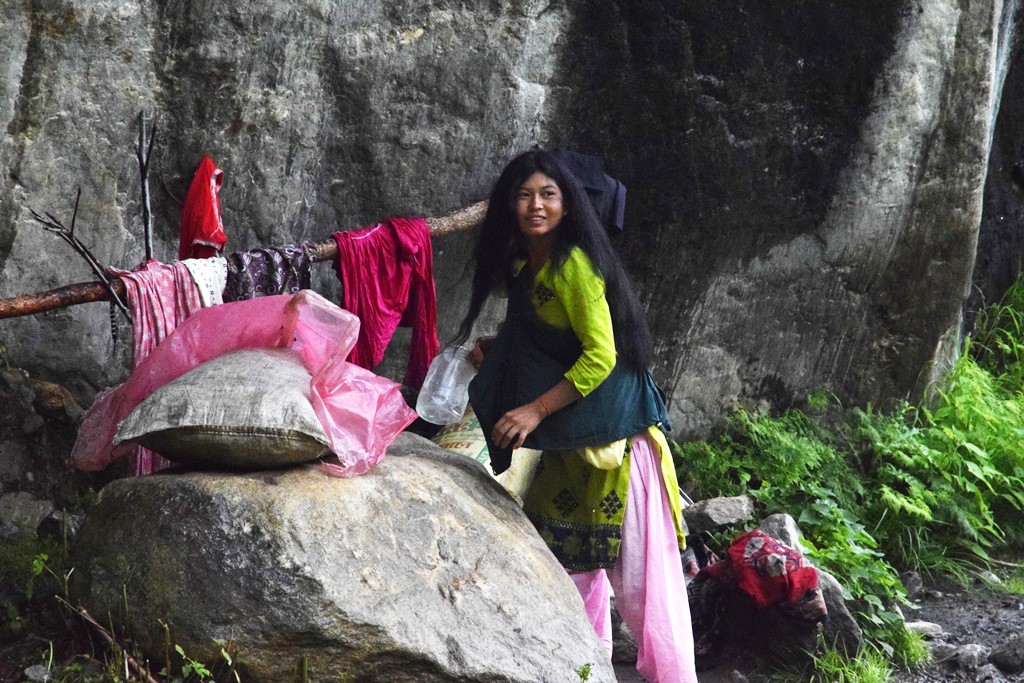
Teenage girl sitting in the den of Dhuli, Saipal rural municipality 4, during her period.
Since then, the sufferings of the local women are incalculable. Thirty-five year-old Birati Rokaya says, “The police came and demolished the shed built with the money that we saved by working hard. The pain we have experienced for the past three years is beyond description.”
Now, the women of the village stay in a nearby den during their periods. As only three people can stay in this den at a time, when more women menstruate at the same time, the rest spend the night in the nearby agricultural land under a plastic cover. Rokaya says, “When it rains, we get completely soaked, and saving our children becomes even more difficult.”
The suffering of women is more severe in winter than in the monsoon. It snows up to five feet in this village, situated at an altitude of 3,000 metres. Ujali Rokaya, who had come out of the dark cave and was basking in the sun, said, “Breastfeeding moms face a lot of challenges as their children get unconscious in the cold.”
Siddheshwar Dikreni, the village where Parvati Rawat lost her life in the menstrual shed in December 2019, has also been declared chhaugoth-free. However, now, almost all families have rebuilt chhaugoths. A new shed has also been built near the house of Chakra Bahadur Kunwar, headmaster of Budhakot Secondary School.
Sharada Thapa of Patalkot, Sanphebagar Municipality-14 of Achham, borrowed Rs 30,000 for rebuilding the shed earlier demolished by the police. Of the 135 sheds demolished by police in this ward, 17 were rebuilt within 15 days.
The women’s readiness to risk their own life by rebuilding the demolished sheds and spending nights in the open shows that the plans and strategies made so far to eliminate the chhaupadi practice are not suitable and the investment made has gone to waste.
This is just one example of how difficult it is to do away with age-old superstitions regarding the natural phenomenon of a woman’s menstrual cycle. Ganga Devi Bohora, a female community health volunteer in ward 5 of Saipal Rural Municipality of Bajhang, says, “After demolishing the shed, we stayed indoors for some time. But then, some people started trembling and some fainted. We believed the gods didn’t accept us, so we started living in the den again.”
Build a new one as you destroy old
The erstwhile Majhigaun village development committee in Khaptadchhanna Rural Municipality of Bajhang was declared chhaugoth-free on December 2, 2014. Before the announcement, awareness training was given to local shamans. The villagers vowed to not discriminate against and treat menstruating women differently from then onwards.
According to the records of the Women and Children’s Office, the local government agencies spent more than Rs 2.5 million on the programme. However, after less than a month, the sheds were built again.
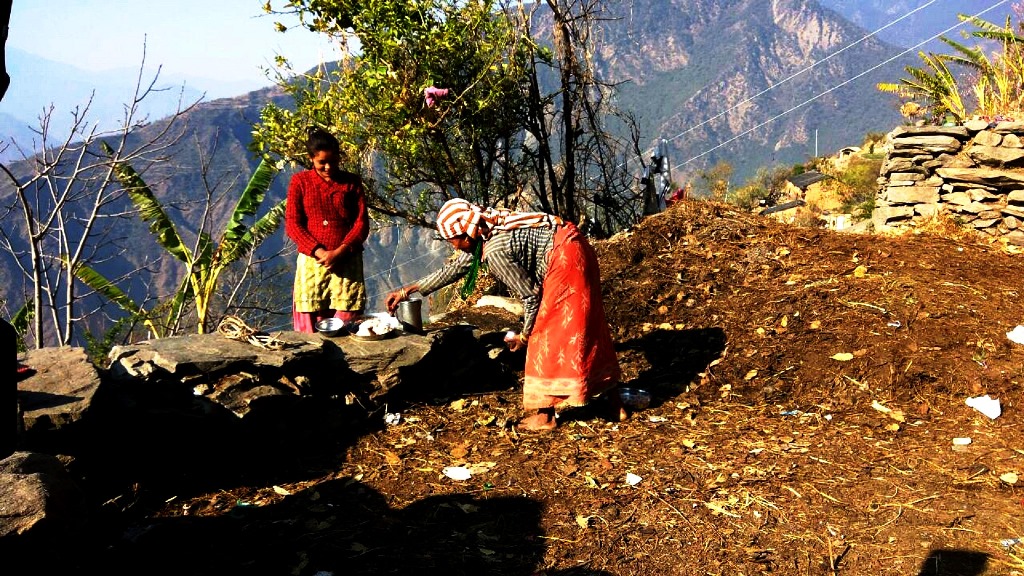
A woman of Jayaprithvi Municipality-11 giving food to her menstruating daughter.
Of the 47 village development committees in Bajhang district, 17 were already declared chhaugoth-free before the state restructuring in 2017. Since then, only Bungal Municipality has been declared chhaugoth-free, but 51 of the 94 wards of the district have already been declared so. In this process, the local government and various government and non-government organisations have spent more than Rs 150 million.
Sushila Khadka, advisor to the Women’s Human Rights Defenders Network, says that the problem arises when campaigns and programmes are conducted just to spend the budget rather than to make real changes. She says, “There should be a big and honest campaign to destroy superstition, but they just have the practice of showing their work in records here.” Not only Bajhang but also other districts that have been declared free of chhaugoths are in the same condition.
On January 8, 2018, Gauri Budha (23) of Turmakhad Rural Municipality of Achham district died of suffocation in her chhaugoth. Turmakhad, 55 km east of the district headquarters Mangalsen, was earlier declared chhaugoth-free by the Chhaupadi Practice Eradication Project run by the Women and Children’s Office and Save the Children.
According to a report by the National Human Rights Commission, 13 people died in chhaugoths of Achham between 2006 and 2018.
Bhojraj Shrestha, the then chief district officer (currently a joint secretary of the Ministry of Urban Development), who led the campaign to demolish the chhaugoths in Achham after Parvati’s death, says the investment made by the government and non-governmental sectors for the eradication of the practice haven’t borne fruit. He says he is fed up with the double standard of leaders and activists who seem revolutionary while giving speeches but continue this discrimination against women in the privacy of their homes. “There are very few people who honestly believe that this practice must be done away with,” he says, “Some other people working for NGOs and INGOs are afraid that they will lose their livelihood if this problem is solved.”
Between 1995 and 2019, the Lutheran World Federation conducted a programme to eradicate chhaupadi practice in various districts of Sudurpaschim and Karnali. The project, ‘Nepal Development Programme’, spent about Rs 170 million for the cause.
Organisations such as United Mission to Nepal (UMN), Netherlands Development Organisation (SNV), Plan International, Care Nepal, and World Vision have been working in the campaign against the chhaugoth practice for a long time.
“Of course, there’s the big investment, but it’s in the wrong places,” says Amar Bahadur Air, executive director of the Gairhasarkari Sanstha Sahakarmi Samaj, an organisation of NGO activists. “The practice of building, demolishing and rebuilding sheds has continued. The campaigns’ only intention seemed to be to give jobs to some people. The problem has not subsided.”
Discrimination at school, contraceptions in childhood
Menstruating women and girls are discriminated against not only at home and other public places but also in schools. Female teachers and students aren’t allowed to go to Janprakash Basic School in Badimalika Municipality-8 of Bajura while on their periods. “There is a shrine of Ratuda god in front of the school. The villagers have banned menstruating women from going to school because they believe the god will get angry,” says Nira Bista, a teacher. Ironically, this municipality has also been declared chhaupadi-free.
Civil society leader Madan Joshi says teachers and students are absent during menstruation in about 20 schools in Bajura. As a result of such practice, female students don’t get to study for five days in a month while the teacher doesn’t teach for the same period. Especially in schools of Badimalika and Budhinanda municipalities and Swamikartik, Himali and Jagannath rural municipalities of the district, this practice continues till today.
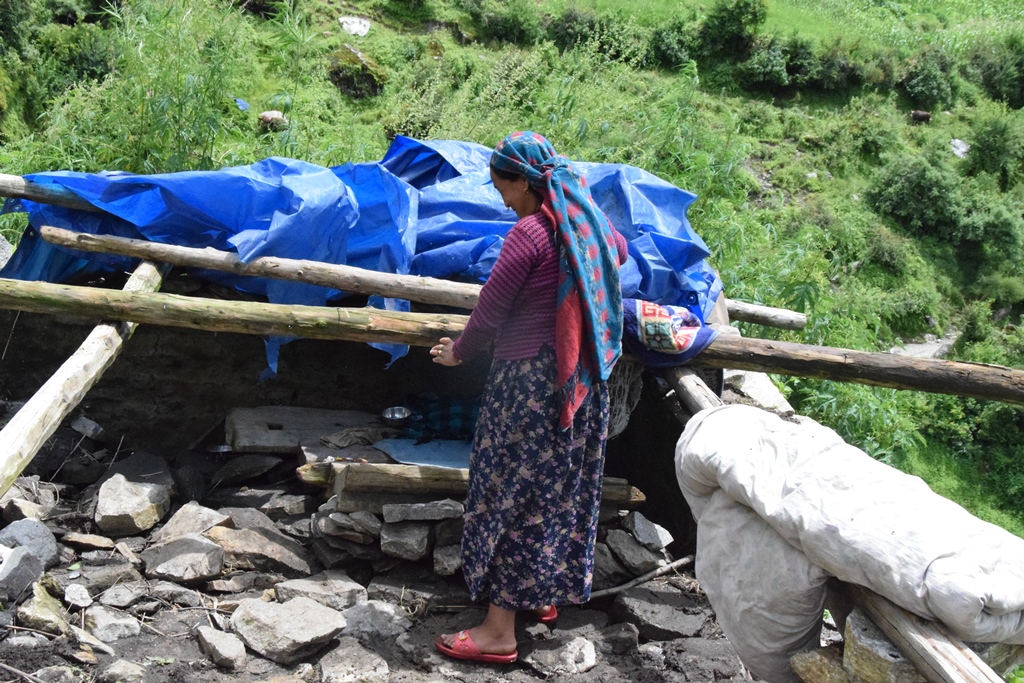
Women of Saipal Rural Municipality living in tents under the ruins.
Not only in Bajura, many schools in Bajhang, Achham, Humla, Kalikot and Mugu also have similar stories. “If you don’t go to school for five days in a row, you miss a lot of chapters,” says Samjhana Karki, a student of Kanya Secondary School at Batulsera, Bungal. “This is why the girls can never top the class.”
Girls of menstruating age are also forced to take birth control pills due to the practice.
It has been found that women and children who have to spend three months a year in high hills to pick herbs such as yarsa gumba take contraceptive pills to prevent menstruation.
When they go to pick herbs, they use Nilocon White, Sunaulo Gulaf, Depo-Provera (three-month syringe), and other drugs. Pavitra Bohora of Surma Rural Municipality of Bajhang says girls in their first period to old women take such medicines alike.
“The money we get from picking yarsa is the only way we can manage school expenses. So every year, I come to pick herbs by skipping classes,” a teenage girl from Surma who studies in Kathmandu says, “When you go to high hills, you can’t find a place to stay if you menstruate.”
Doctors say the indiscriminate use of contraceptives causes many health problems. Sarita Bohora, 22, from Bajhang Surma, shares her experience, “After stopping the medicine, the stomach aches so severely that you feel you are dying during menstruation. Bleeding doesn’t stop without taking medicine again.”
She says that some women have experienced infertility since their first period and this has led to strife in families.
The money goes to waste
An important example of how the expenditure in the name of the chhaupadi eradication is misused is given by a parliamentary study team.
On December 30, 2018, a parliamentary team left Kathmandu to go to Agaupani Pandusen in Bajura to look into the death of 35-year-old Amba Bohora and her two sons in a chhaugoth. But, it prepared its report without visiting the site. All lawmakers received travel allowances for the assignment.

A menstruating woman of Jaya Prithvi Municipality-8 in front of the shed.
The seven-member team of the Women and Social Committee of the House of Representatives was chaired by Ganesh Singh Thagunna whereas its members were lawmakers Amrita Thapa, Ganga Chaudhary, Bimala Nepali, Ruhi Naz Mikrani and the then joint secretary of the committee Hridayram Maharjan, along with Lal Bahadur Thapa, a member of the House of Representatives from Bajura.
Strangely enough, the team that did not reach the incident site submitted the report of an on-site study and an interaction with locals and received Rs 85,000 as travel allowance.
Diladatta Pant and Krishna Subedi of the United Nations Development Project (UNDP) Parliamentary Assistance Project were also with the team throughout the visit. UNDP provided logistical support to the six-day study tour (January 30-February 4, 2019).
The report says the committee couldn’t reach the incident site due to snowfall and rain. But, team member Amrita Thapa says lawmakers from the district didn’t want them to visit the incident site.
“Even though we strongly insisted that those who could walk go to the scene on foot, the honourable member from Bajura did not pay heed,” says Thapa.
The team that didn’t want to walk two hours to get to the site invited Pandusen’s ward chair Khadak Bohora, the deceased’s husband Kashi Bohora and other stakeholders to Dhamkane to collect information.
Radha Poudel, an activist campaigning for women’s rights to dignified menstruation, says that the government is not interested in long-term solutions. “Whenever we do any work, the changes it brings should be evident,” she says. “But, the menstrual huts of Sudurpaschim and Karnali have been hijacked by NGOs to bring in projects.”

